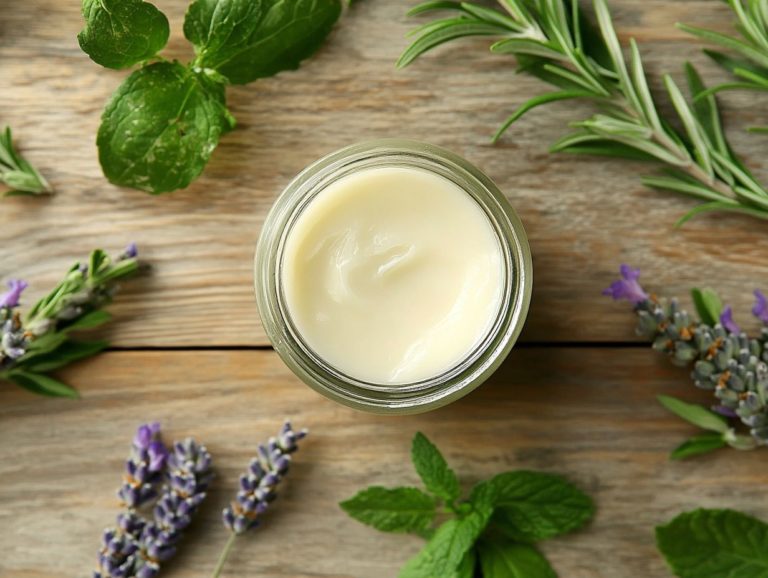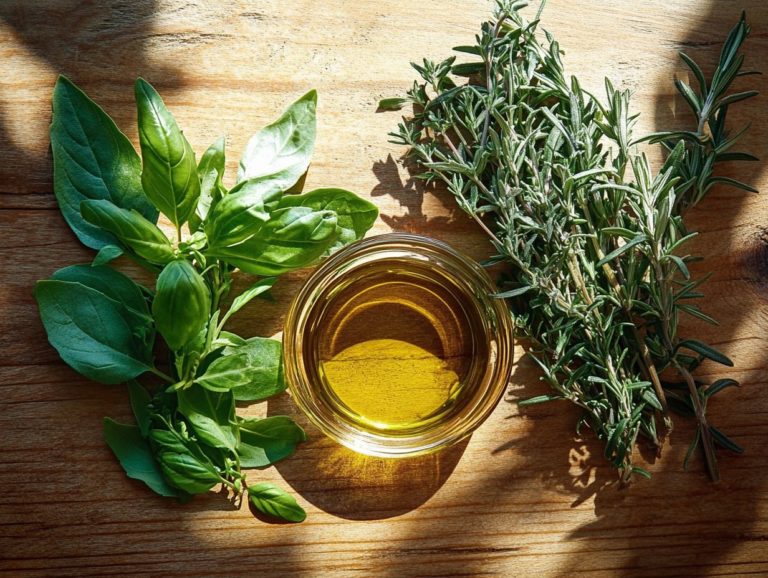Herbs to Help with Blood Sugar Regulation
Maintaining balanced blood sugar levels is super important for your overall health, impacting everything from your energy levels to your long-term risk of disease.
This article delves into the significance of blood sugar and showcases a selection of common herbs that can help you regulate it naturally. You’ll uncover the benefits these herbs offer, learn how to seamlessly incorporate them into your daily diet with easy-to-follow recipes, and gain insights into any potential side effects.
It also discusses when to consult a health care professional for personal guidance. Embrace the transformative power of herbs for improved blood sugar management!
Contents
- Key Takeaways:
- Understanding Blood Sugar Regulation
- Common Herbs for Blood Sugar Regulation
- How to Incorporate Herbs into Your Diet
- Possible Side Effects and Interactions
- Consulting with a Healthcare Professional
- When to Seek Medical Advice
- Frequently Asked Questions
- What are some common herbs that can help with blood sugar regulation?
- How does cinnamon help with blood sugar regulation?
- What is fenugreek and how does it aid in regulating blood sugar?
- Can herbs really replace medication for blood sugar regulation?
- Are there any potential side effects of using herbs for blood sugar regulation?
- How can I incorporate these herbs into my diet?
Key Takeaways:
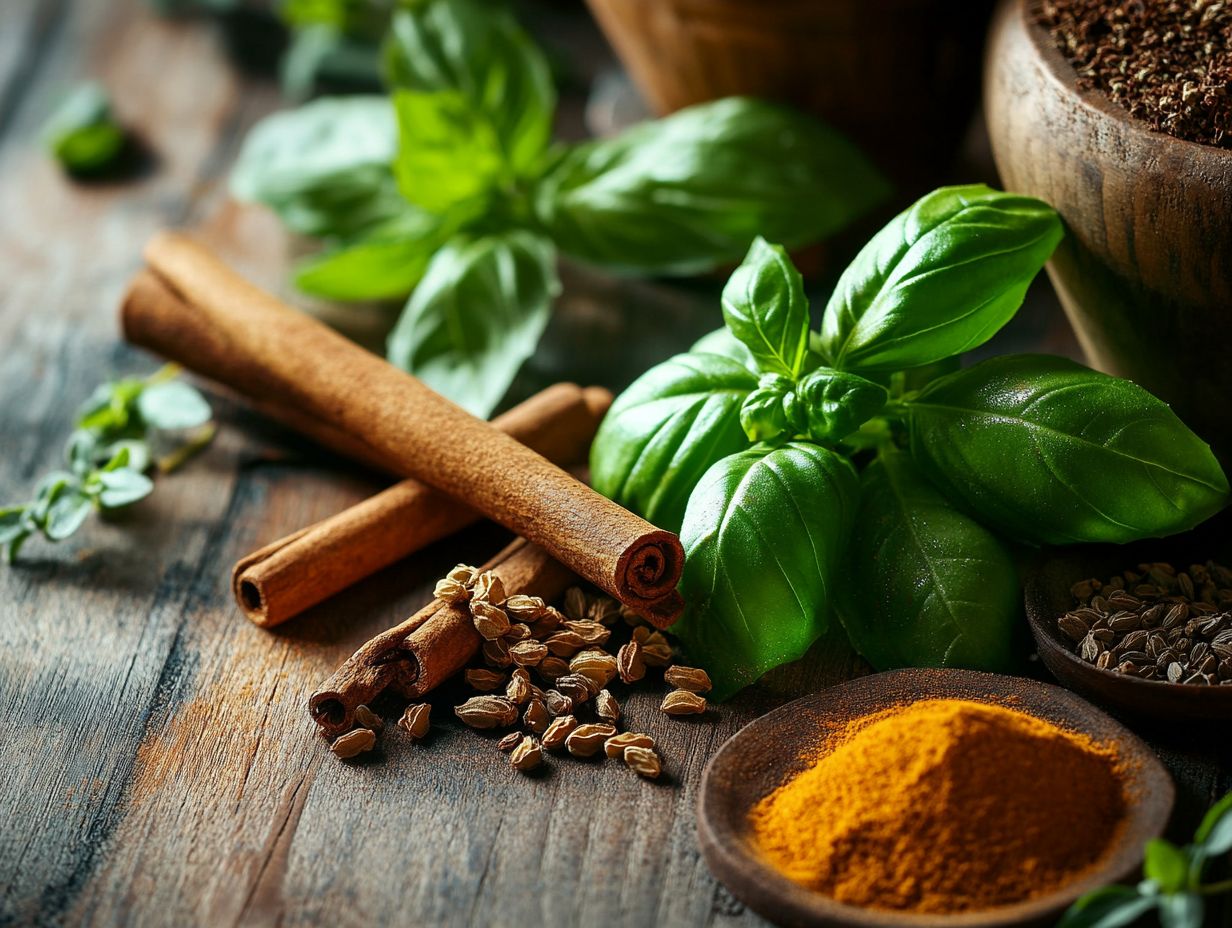
- Regulating blood sugar is vital for your overall health!
- Incorporating common herbs such as cinnamon, ginger, and turmeric into your diet can help regulate blood sugar levels.
- It’s important to consult with a health care professional before using herbs for blood sugar regulation, especially if you have any pre-existing medical conditions or are taking medications.
Understanding Blood Sugar Regulation
Grasping the intricacies of blood sugar regulation is crucial, especially concerning type 2 diabetes, which impacts one in three adults in the United States, as reported by the American Diabetes Association.
Your blood sugar levels play a critical role in your overall health, affecting everything from your energy levels to lipid metabolism. They also affect the body s ability to manage and utilize insulin effectively.
When blood glucose levels remain imbalanced over time, the risk of severe health complications increases, making this a prominent public health issue. Therefore, keeping a close eye on these levels, along with monitoring hemoglobin A1C, is vital for effectively managing your health and preventing diabetes-related complications.
What is Blood Sugar and Why is it Important?
Blood sugar, or glucose, serves as your body’s primary energy source, playing a crucial role in how your body uses energy. This is especially true for individuals with diabetes mellitus, where keeping blood sugar levels steady becomes essential.
Various foods, particularly those rich in carbohydrates think bread, fruits, and sugars play a significant role in influencing your blood sugar levels. Once you consume these carbohydrates, your body breaks them down into glucose, which then enters your bloodstream, supplying the fuel needed for both physical and mental activities.
Without proper regulation, fluctuations in blood sugar can lead to energy shortages or excessive spikes, both of which can jeopardize your overall health. Insulin, a hormone produced by your pancreas, is key in this process, as it facilitates the uptake of glucose into your cells, ensuring that energy is readily available.
For health professionals managing patients with diabetes, careful monitoring of blood sugar levels is vital. This vigilance helps to prevent complications and supports overall well-being.
Common Herbs for Blood Sugar Regulation
You may find that common herbs like cinnamon, fenugreek, berberine, and American ginseng are gaining recognition for their remarkable potential in regulating blood sugar levels.
These herbs are particularly valuable for individuals managing type 2 diabetes, offering a natural approach to enhancing overall health through herbal medicine.
Benefits and Uses of Each Herb

The benefits and uses of herbs like cinnamon and fenugreek have been extensively researched. These herbs may help lower blood glucose levels and enhance insulin sensitivity, making them valuable allies in managing diabetes.
Cinnamon, particularly its water-soluble extracts, may improve insulin sensitivity. This can be a game-changer for effectively managing your blood sugar.
On the other hand, fenugreek seeds are rich in soluble fiber, which helps slow down the digestion and absorption of carbohydrates. This can positively influence your blood glucose levels.
For those seeking optimal outcomes, a daily dosage of one to six grams of cinnamon is often recommended. Fenugreek typically falls within the range of five to twenty grams. You can enjoy these herbs in various forms, including dietary supplements, soothing teas, or as flavorful additions to your meals.
However, make sure to remain vigilant about potential interactions with medications, such as blood thinners and insulin. Don t skip this step consulting a healthcare professional before making significant changes to your health regimen is important.
How to Incorporate Herbs into Your Diet
Incorporating herbs such as cinnamon and fenugreek into your diet offers a delightful and healthful approach to enhancing glycemic control while supporting your overall well-being. This is invaluable for those looking to manage diabetes through herbal medicine and dietary supplements.
Recipes and Tips for Using Herbs
Creating delectable recipes that feature herbs like cinnamon and fenugreek can elevate your meals while naturally aiding in blood sugar management.
Using these tasty ingredients in your cooking can bring big health benefits alongside unique and exciting flavors. For instance, imagine starting your day with a cinnamon-infused smoothie made from almond milk, banana, and a sprinkle of flaxseed. This delightful concoction offers sustained energy without the notorious blood sugar spike.
A fresh fenugreek salad with ripe tomatoes, crisp cucumbers, and a zesty lemon vinaigrette not only excites your palate but delivers essential nutrients that support glucose control.
Keep in mind that balancing flavors while preserving the medicinal qualities of these herbs is crucial. Consider enhancing your soups, stews, and even baked goods with these herbs to effortlessly enrich your meals.
Possible Side Effects and Interactions
While herbs can provide numerous benefits for managing blood sugar, remain aware of potential side effects and interactions with medications. Consulting with health professionals before adding herbal supplements to your regimen is essential to ensure your safety and well-being.
Precautions and Warnings
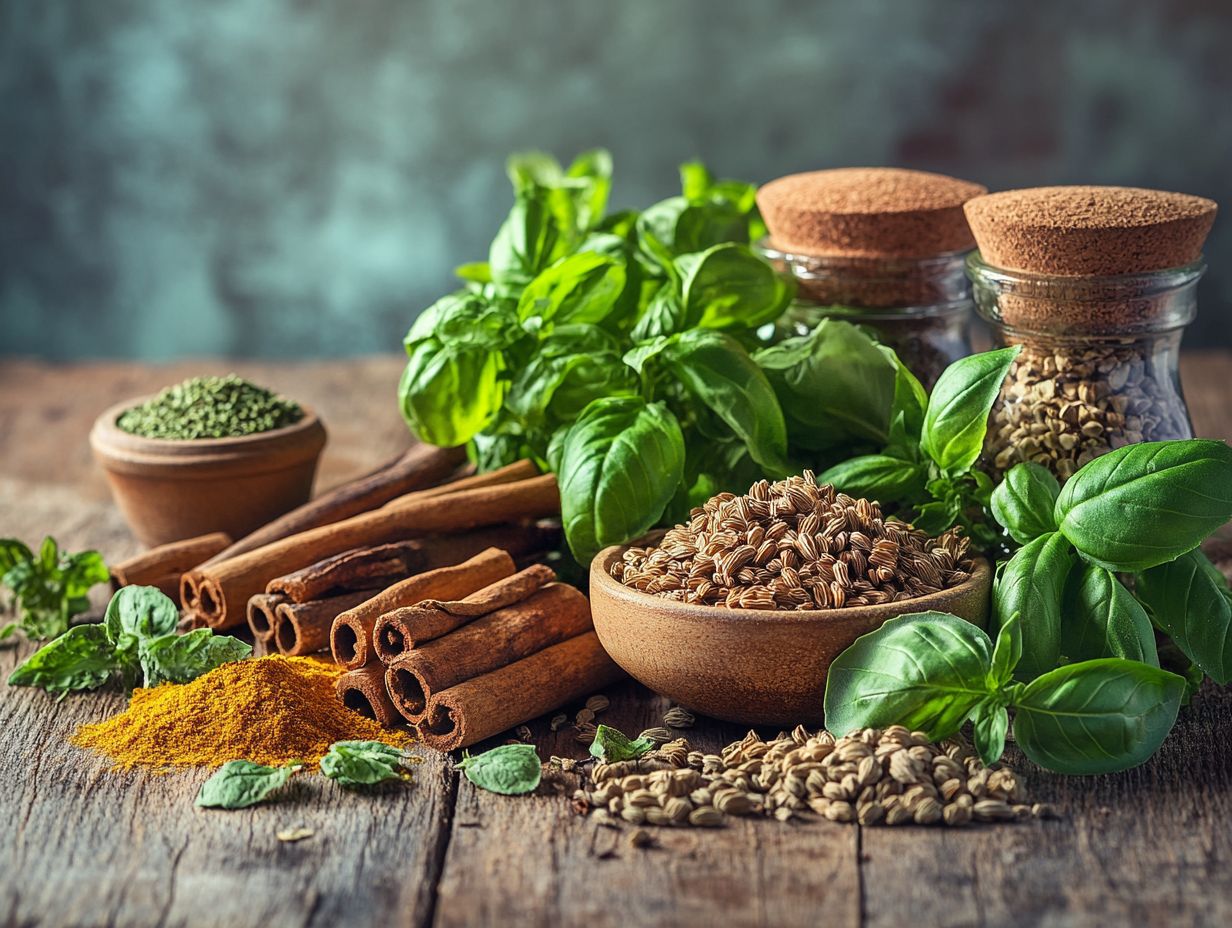
When considering herbal treatments for blood sugar regulation, make sure to take precautions, especially if you belong to high-risk groups like pregnant women, who may experience unique reactions to various herbal medicines.
For those with pre-existing health conditions, such as diabetes or kidney issues, exercising caution is equally important. Engaging in conversations with your healthcare provider before introducing any herbal remedies into your regimen is crucial, as some herbs can interact with medications or worsen existing health problems.
Given the variability in individual reactions to herbal treatments, adopting a personalized approach is paramount. Monitoring for any adverse effects and ensuring that your chosen remedies do not contraindicate other treatments are vital steps in managing your health safely.
Consulting with a Healthcare Professional
Consulting with a healthcare professional is crucial for anyone managing diabetes. They offer personalized medical advice tailored to your unique situation, especially regarding the safe use of herbal medicine and dietary supplements.
Engaging with a qualified expert ensures that your health decisions are informed and aligned with your specific needs.
Start adding these herbs to your meals today!
When to Seek Medical Advice
Recognizing when to seek medical advice is essential for effective diabetes management. Pay attention to symptoms like high blood sugar and complications related to diabetes mellitus.
You should pay close attention to persistent high blood sugar levels, which might show up as increased thirst, frequent urination, blurred vision, and even unexplained weight loss. If you’re feeling fatigue that just doesn’t seem to improve with rest, it could indicate an underlying issue that warrants a medical evaluation.
Slow-healing wounds and recurrent infections are serious signs that need immediate attention.
It s crucial for anyone experiencing these symptoms to seek help! Proper management and a swift medical response can significantly reduce the risk of long-term complications, paving the way for a healthier lifestyle.
Frequently Asked Questions
What are some common herbs that can help with blood sugar regulation?
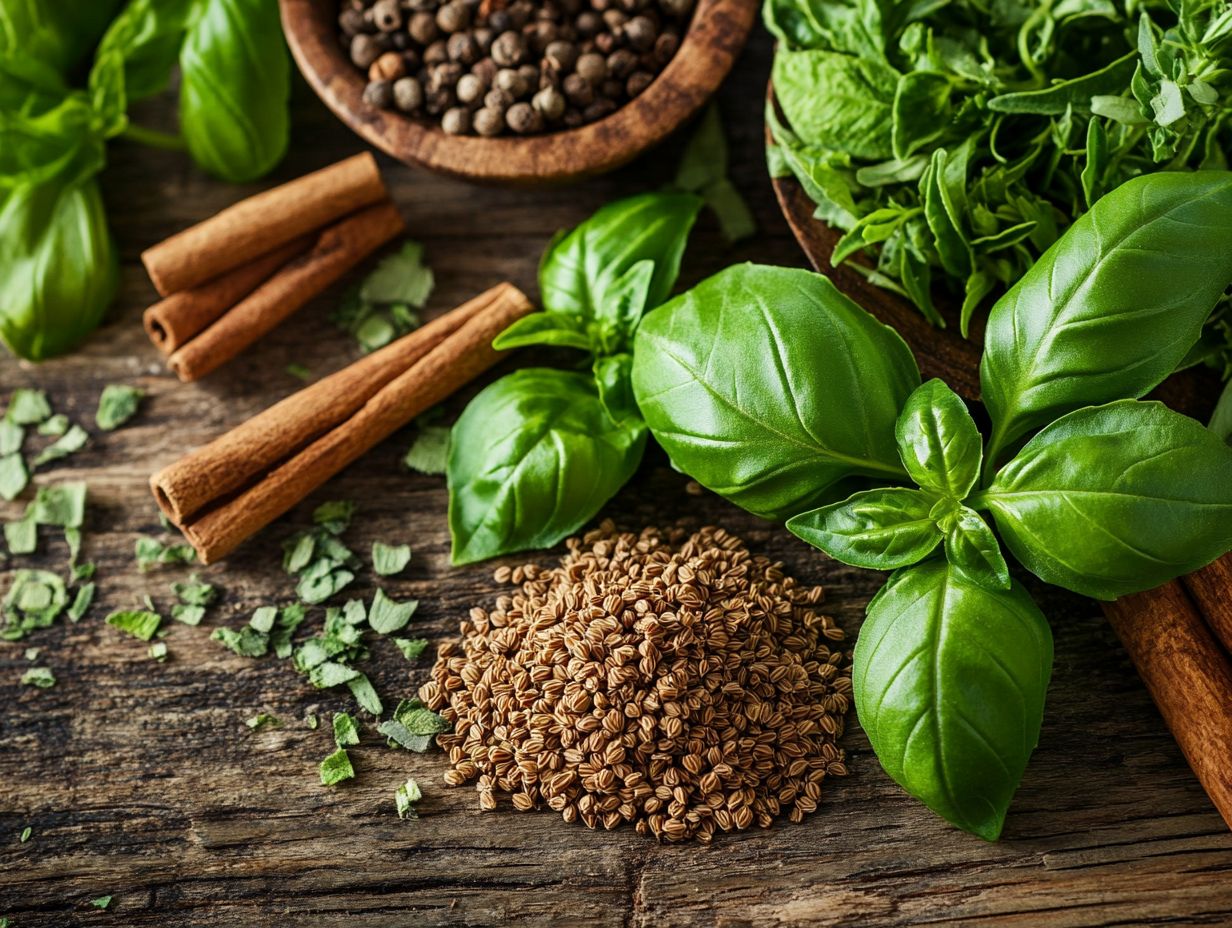
Some common herbs that can help with blood sugar regulation include cinnamon, fenugreek, gymnema, bitter melon, and ginger.
How does cinnamon help with blood sugar regulation?
Cinnamon contains compounds that can mimic insulin and help regulate blood sugar levels. It can also improve how well your body responds to insulin.
What is fenugreek and how does it aid in regulating blood sugar?
Fenugreek is an herb often used in traditional medicine for its anti-inflammatory and blood-sugar lowering properties. It can help slow down the absorption of sugar in the intestines and increase insulin sensitivity.
Can herbs really replace medication for blood sugar regulation?
No, herbs should not be used as a replacement for medication prescribed by a doctor. However, they can be used as a complementary treatment and may help improve blood sugar control when used in combination with a healthy diet and exercise.
Are there any potential side effects of using herbs for blood sugar regulation?
While herbs are generally safe for consumption, they may interact with certain medications or have side effects for individuals with specific health conditions. It’s important to consult with a healthcare professional before starting any new herbal regimen.
How can I incorporate these herbs into my diet?
Herbs can be added to meals, brewed into teas, or taken in supplement form. It’s important to follow recommended dosages and consult with a healthcare professional for proper usage.
If you notice any of these symptoms, don t wait talk to your doctor today!


